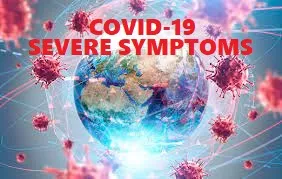 |
| COVID-19 |
The
symptoms of the different variants of COVID-19) vary widely. Does it still
baffle you that some people develop no symptoms at all, while others get so
sick that they barely survive in hospital and sometimes on a ventilator for
breath? It’s all about a person’s level of immunity.
Health issues
such as lung disease, heart conditions,
diabetes, obesity, sickle cell disease, weakened immune systems, respiratory illnesses
such as influenza and even old age can increase your risk of developing severe
COVID-19 symptoms.
Let’s look
at health conditions that can increase the risk of dangerous COVID-19 symptoms:
Lung infections
If you develop
any of the listed lung conditions below, avoid COVID-19 at all costs because
the symptoms are likely to be dangerous:
- Moderate to severe asthma
- Lung cancer
- Chronic obstructive pulmonary
disease (COPD)
- Pulmonary fibrosis
- Cystic fibrosis
Your immune system may get
weakened by certain medications for these lung infections. Therefore, it’s
important to consult your doctor to avoid such medications and also ensure the
supply of emergency supply of prescription medications, including asthma
inhalers.
You may also need to avoid
asthma triggers such as dust mites, pollen, cold air, tobacco smoke, strong
odors, strong emotions and stress. Triggers differ per person though!
Heart
disease
If you have
developed any of these heart conditions below, your COVID-19 symptoms may be
quite severe:
· Pulmonary
hypertension
· Heart failure
· Cardiomyopathy
· Congenital heart
disease
· Coronary artery
disease
Proceed
with taking your prescribed medications. Also, remember to control your blood
pressure if you have high blood pressure, else the risks of dangerous symptoms may
be higher.
Diabetes
and obesity
If you have
type 1 or type 2 diabetes, your risk of serious COVID-19 symptoms increases.
This is the same with being overweight or obese.
Your immune
system gets weakened by diabetes and obesity. Generally, people who have
diabetes have an increased risk of infections.
Losing
weight, keeping your blood sugar levels controlled, and taking your medications
and insulin are the best ways to control the condition.
Brain and nervous
system conditions
If your
brain or nervous system is affected by some conditions, that may make your risk
of developing COVID-19 symptoms severe. Such conditions include:
- Dementia
- Stroke
Cancer and
certain blood disorders
If you have
cancer, your risk of dangerous COVID-19 symptoms may also be higher. However, this
depends on the cancer type and type of treatment.
A blood
disorder such as sickle cell anemia can also increase the risk of serious
COVID-19 symptoms. These are deformed red blood cells that don’t last long,
making oxygen unable to be transported around your body.
Moreover, thalassemia
is another inherited blood disorder that may increase your risk of dangerous COVID-19
symptoms.
Always take
your medications as prescribed and follow the doctor’s advice.
Weakened immune
system
Maintaining
a strong immune system is the healthiest thing your body needs to fight
infections. Here are conditions to avoid to maintain a healthy immunity:
- Cancer treatments
- HIV/AIDS
- Organ transplants
- Bone marrow transplant
- Long-term use of drugs that weaken
your immune system
If your immune
system is weakened, take extra precautions to protect yourself from COVID-19.
Chronic kidney or
liver disease
People who
have chronic kidney or liver disease may end up with a weakened immune system. Also,
treating severe COVID-19 symptoms with medications can affect the liver
negatively.
If you are
presently on dialysis for chronic kidney disease, don’t skip any dialysis
appointment as it helps you know if you feel ill.
Mental health
conditions
If you have
a mental health condition such as depression and schizophrenia spectrum
disorder, your COVID-19 symptoms may be quite serious as well.
Down syndrome
A person with down syndrome
can develop lung infections. This makes them vulnerable to COVID-19 and other
conditions prune to COVID-19 symptoms. They include obesity, diabetes, heart
disease and sleep apnea.
Unfortunately,
many older people with down syndrome live in nursing homes where exposure to
germs from other residents and staff is easier. Also, the condition often
affects intellectual abilities, making it hard for those infected to follow
prevention measures.
Older age
COVID-19
can spread to people of all ages, including children. However, the older you
get, the more you risk developing dangerous COVID-19 symptoms. No wonder people
older than 85 years have a much higher risk. Up to 81% of COVID-19 deaths in
the U.S are among people from age 65 and older, particularly the ones with
other health conditions.
Never
forget to take all your medications according to prescriptions. Learn about
your medical conditions, medications, emergency contacts, doctors' names and
protection measures especially as a nursing resident.
To diminish
your risk of contracting COVID-19 and particularly the risk of severe symptoms,
protect yourself by following COVID-19 guidelines, including taking the
vaccine. Ensure that your vaccinations even for other conditions are up-to-date.
















0 Comments